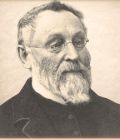COMMON NAME:
GREEN HELLEBORE.
Symptoms
Exerts a decided influence upon the brain, especially cerebellum and cerebral portion of the cord, and also over the muscular system.
It probably acts on the inhibitory nerves of the heart, controlling the heart’s action in a remarkable degree.
Congestive stage of inflammation, with great arterial excitement (Aconite, Belladonna, Ferr-P.) (D.).
RAPID FULL PULSE (Aconite, Belladonna, Ferr-P., Gloninum, Phosphorus) (D.).
Spasmodic diseases with gastric irritation and much vascular excitement (Ferr-P.) (D.).
INTENSE FEVER, WITH TWITCHING AND TENDENCY TO SPASMS (Aconite, Belladonna, Stramonium, Sulphur). (N.).
INTENSE CEREBRAL CONGESTION (Aconite, Belladonna, Gloninum, Lachesis, Meli., Natrum muriaticum, Opium, Sulphur) (Bt.).
Feeling as though the head would burst open (Belladonna, Cannabis indica, Gloninum); accompanied with nausea and vomiting (Bryonia, Sanguinaria) (Bt.).
Can hardly hold the head up from paralysis of the muscles of the neck (Silicea). (Bt.).
Diplopia, of near objects (Aurum, Belladonna, Cicuta, Conium, Acid nitricum, Phytolacca, Stann.; of distant objects–Am-C., Belladonna, Acid nitricum, Plb.) (K.).
Dimness of vision from congestion to the base of the brain (Gelsemium) (Bt.).
Loss of sight, with great faintness (Phosphorus) (Bt.).
Ringing in the ears, from congestion of blood to the head (Belladonna, Ferrum), with nausea and vomiting (Bt.).
Face cold, pale or livid; nose looks pinched, cold and blue (Bt.).
CONGESTION, ESPECIALLY TO THE BASE OF THE BRAIN, CHEST, SPINE AND STOMACH (A.).
SUDDEN SPASMS, FROM INTENSE CONGESTION OF BLOOD TO THE HEAD (Aconite, Belladonna, Gloninum, Opium) (Bt.).
Child tremble, jerks, threatened with convulsions; continual jerking or nodding of the head (Stramonium) (A.).
BASILAR MENINGITIS; HEAD RETRACTED CHILD ON THE VERGE OF SPASMS (Tuberculinum) (A.).
A dry, red streak down the centre of the tongue (D.).
Copious secretion of saliva (Kali bichromicum, Mercurius, Tabacum) (Bt.).
Tongue coated yellow (Chelidonium, Merc-I-F., Nat-S.). (Bt.).
Vomiting of food, and large quantities of glairy mucus (Kali bichromicum) (Bt.).
VIOLENT AND LONG-CONTINUED VOMITING (Arsenicum, Ipecac., Nux vomica, Phosphorus, Veratrum) (Bt.).
Nausea on rising (Aconite, Arnica, Bryonia, Carb-An., Chelidonium, Cocc., Ferrum, Nat-S., Phosphorus, Senec., Veratrum, Zincum met.) (D.).
Frequent and long-continued hiccough (Arsenicum, Magnesia phos., Nux vomica), with a constant sensation as if a ball were rising in the oesophagus (Argentum nitricum, Asafoetida, Nux-M.) (Bt.).
Heavy aching pains in the umbilicus (Bt.).
Acute rheumatism; high fever; full, hard, rapid pulse; severe pains in the joints and muscles (Bryonia, Salic-Ac.); scanty, red urine (A.).
CONGESTIVE APOPLEXY; HOT HEAD, BLOOD-SHOT EYES, THICK SPEECH, AND SLOW FULL PULSE, HARD AS IRON (A.).
Involuntary stool and urine (Kali-P., Acid phosphoricum., Sulphur) (A.).
Dropping of the lower jaw (Hyoscyamus, Lycopodium) (A.).
Picking of bed-clothes (Hyoscyamus) (A.).
Boring the head into the pillow (Belladonna, Helleborus, Stramonium) (A.).
IS OF SERVICE IN THE CONGESTIVE STAGE OF PNEUMONIA. THE TEMPERATURE IS HIGH, THE PULSE IS HARD, FULL AND RAPID THE RESPIRATIONS ARE RAPID AND ARE OFTEN ASSOCIATED WITH A GASTRIC IRRITABILITY (Bl.).
Acute bronchitis and asthma associated with severe congestion of the lungs and great difficulty of breathing (Bl.).
Useful in endo-carditis and peri-carditis, when there is great arterial excitement and distress in the praecordial region (Bl.).
HYPER-PYREXIA, OR RAPIDLY OSCILLATING TEMPERATURE (Arsenicum, Belladonna, Stramonium) (B.).
Delirious, quarrelsome, striking and kicking with hands and feet (Belladonna, Cantharis, Stramonium) (R.).
Breathing heavy, difficult, slow, short, convulsive, almost to suffocation; constriction of the chest (R.).
Sense of utter prostration (Arsenicum, Camph., Hydr-Ac.) (C.).
Violent, (galvanic battery-like) shocks in the limbs (C.).
Menstrual colic, with nausea and vomiting (Cocc., Ipecac., Nux vomica, Pulsatilla, Sepia) (Bt.).
Dysmenorrhoea (Belladonna, Coloc., Magnesia phos., Nux vomica, Pulsatilla, Sepia) (Bt.).
Puerperal peritonitis or metritis (Apis, Belladonna, Bryonia, Lachesis, Pulsatilla, Rhus toxicodendron), with nausea and vomiting (Bt.).
Puerperal convulsions, with intense congestion of blood to the brain (Belladonna, Lachesis, Stramonium) (Bt.).
Nervous or sick headache; congestion from suppressed menses; intense, almost apoplectic, with violent nausea and vomiting (A.).
Heart beats loud and strong, with great arterial excitement (Aconite, Belladonna) (C.).
Tongue feels as if it has been scalded (Iris, Sanguinaria) (C.).
AGGRAVATION:
From rising up; from motion; from cold; from lying on the back; from suppression of menses; from heat of the sun; from heat of the sun; from noise; on waking; and in the evening.
AMELIORATION:
From rubbing; from lying with head low; and from hot, strong coffee.
RELATIONSHIP:
Compare: Aconite, Belladonna, Cuprum, Ferr-P., Gelsemium, Gloninum, Helleborus, Hyoscyamus, Ipecac., Kali-P., Lachesis, Meli., Natrum muriaticum, Nux- V., Opium, Phosphorus, Rhus toxicodendron, Stramonium, Sulphur and Veratrum

